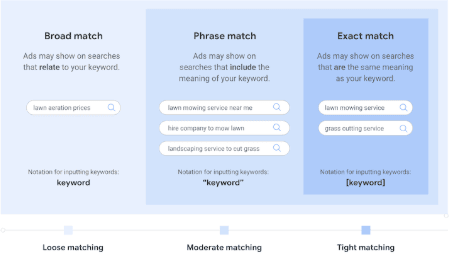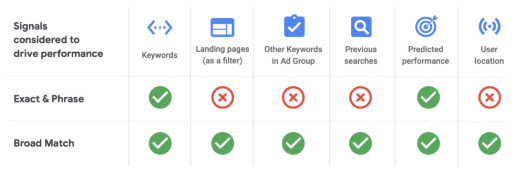Broad match has a bad rap. They used to be the match type we all avoided. By bidding on them, we were less targeted, the CPCs were higher in the auction, and if we weren’t careful, we could blow our budget on some irrelevant terms.
But that was then, and this is now.
The truth is the digital advertising landscape is evolving, and relying solely on phrase and exact-match keywords is no longer the best route to success. With Google’s algorithm becoming more sophisticated through machine learning and AI, it’s essential to shift your thinking—and your keyword match types—if you want to stay ahead.
That’s why, in this post, we’re going to help you understand broad match a little bit better and give you a few sneaky tips on how to utilise them a little better in your strategy.
Why Exact Match & Phrase Match Are No Long The Gold Standard
The Decline of Exact Match Keywords
Exact match keywords used to be the gold standard for controlling ad targeting. You could trust that your ads would only show when someone searched for that specific phrase. But those days are behind us. Google now focuses more on understanding intent rather than just the words themselves.
This shift is great in theory—after all, it means Google can find new opportunities for your ads. However, it also means exact match keywords are no longer as “exact” as they used to be.
Today, exact match keywords can trigger your ads for queries that Google considers “close variants”—these could be synonyms, plurals, or even loosely related terms. While this might open up your ads to new traffic, it also means your targeting can drift, showing your ads for irrelevant searches and leading to wasted spend.
Phrase Match Isn’t What It Used to Be
And what about phrase match keywords? Unfortunately, they’ve also evolved to behave more like broad match keywords. The precision you once enjoyed with phrase match has diminished, making them less useful for advertisers who want tighter control over their campaigns.

Why Google is Pushing Broad Match
So, why is Google pushing advertisers towards broad match keywords?
In short: data. Broad match allows Google’s machine learning algorithms to tap into signals other match types can’t access.
These signals include:
- User Behaviour: Google looks at past online behaviour and figures out what they are looking for.
- Search Intent: Google tries to understand the intent of each search. Are they looking to purchase? Or are they looking for information? They then serve the most relevant ads based on this.
- Search Context: Google considers the context of a search—things like the time of day, the user’s device, or where they’re located.
- Geographical Location: They look at the location of the searcher.
- Device: What are they searching on.
- Real-time Signals: They take into account real-time events, trends and behaviour.
- Landing Page Content: What’s on the pages of your site, and how does this relate to what people are searching for.
By using broad match, you unlock Google’s full suite of AI capabilities, which can help your ads reach potential customers you might not have targeted otherwise. This ability to interpret and act on various signals, such as user intent, device, and search history, makes broad match more adaptive and powerful, especially when paired with Google’s AI. In contrast, exact and phrase match keywords primarily focus on the direct relationship between the keyword and search query, limiting their ability to benefit from these additional signals.
In fact, using anything other than broad match can limit the potential of machine learning to drive your campaign’s performance.

The 7 Benefits Of Harnessing Broad Match Keywords
Harnessing Google’s Machine Learning Capabilities:
Broad match taps into Google’s powerful machine learning, allowing the system to understand search intent rather than just matching keywords exactly. This flexibility lets Google consider things like user behaviour, location, and search history, helping your ads reach people you might not have targeted otherwise.
Reaching a Wider Audience:
With broad match, your ads can appear for related terms, synonyms, or even phrases with the same intent. This wider reach helps capture relevant traffic that more restrictive keyword types might miss, giving you the chance to discover new high-performing keywords.
Unlocking Hidden Opportunities:
Broad match gives Google the freedom to show your ads for terms that, while not a direct match to your keywords, are still highly relevant. This opens up opportunities to reach new audiences and discover valuable keyword variations that you might not have thought of.
Maximising Ad Campaign Efficiency:
Broad match provides Google’s AI with more data, which helps the system optimise your bids more effectively. By analysing search patterns and user behaviour, it can predict which searches are likely to lead to conversions, improving overall performance and making your budget work harder.
Simplifying Keyword Management:
Broad match makes managing your campaigns easier by reducing the need for long lists of exact and phrase match keywords. You can target a wider range of relevant searches with fewer keywords, though it’s important to maintain a good negative keyword strategy to stay on track.
Adapting to Search Evolution:
As search behaviour becomes more conversational and complex, broad match is ideal for adapting. It ensures your ads can show for long-tail or more varied search queries, helping your campaigns stay relevant as user search habits evolve.
Reducing Missed Opportunities Due to Limited Keyword Lists:
Exact and phrase match keywords can be too restrictive, limiting your reach to very specific searches. Broad match ensures that even if users don’t use the exact keyword you’re targeting, your ads can still appear for queries that are closely related, reducing the chance of missing valuable traffic.
The Importance of Negative Keywords
Here’s the caveat to using broad match: broad match can be incredibly powerful, but only when paired with a strong negative keyword strategy. Without this, broad match can lead to ads being triggered by completely irrelevant searches, wasting both your budget and your time.
Google will try to match broad keywords in numerous ways: through the words themselves, their meaning within a phrase, or even just by association. This means your ads can show for a huge range of searches—some relevant, but others far off the mark. That’s where negative keywords come in.
A great place to start is by reviewing the search terms report from your past campaigns. This report will show you the actual search queries that triggered your ads, giving you insight into irrelevant terms. Look for patterns in queries that have led to wasted clicks, and add those to your negative keyword list. The search terms report can help you quickly identify phrases that don’t convert and refine your targeting over time.
While identifying negative keywords, focus on the intent behind the search queries. Some terms might seem relevant at first glance, but their intent could be misaligned with your goals. For example, if you run a premium service business, someone searching for “free” solutions might not be a good match for your ads.
It’s easy to focus on the most obvious irrelevant keywords, like “free” or “cheap,” but dig a little deeper. Consider industry-specific jargon, unrelated geographic locations, or competitor brand names that could be triggering your ads. For example, if you don’t ship internationally, you’ll want to exclude search terms related to countries where you don’t operate. The more nuanced your negative keyword list, the more focused your campaigns will be.
How to Manage Your Broad Match Strategy
If you’re hesitant about adopting broad match, it’s understandable. It’s easy to assume Google’s recommendation is just a way to get you to spend more. And 9 times out of 10, you’d probably be right in thinking that.
However, broad match is actually designed to enhance campaign performance by giving Google the flexibility to gather data and find high-performing keywords you might not have considered.
That said, not every business has the luxury of waiting for Google’s algorithms to optimise over time. The early stages of broad match campaigns can see a lot of “wasted” spend, and that’s when panic can set in. But if you approach it with a clear strategy, you can make broad match work without blowing your budget.
Before launching a campaign, carefully think about the types of searches you don’t want your ads to appear for, and create a negative keyword list. This will stop your ads from showing for irrelevant terms right from the start. Once your campaign is live, keep a close eye on the search terms report to spot any irrelevant queries that have slipped through. Regularly update your negative keywords to keep your targeting focused and your costs in check.
Final Thoughts: Broad Match + Negative Keywords = Success
By targeting broad match keywords, you’re capitalising on Google’s advanced understanding of search intent and its ability to optimise campaigns through data and machine learning. When paired with a well-maintained negative keyword list, broad match enables you to expand your reach, discover new opportunities, and let AI help you optimise performance without the restrictions of more traditional keyword match types.
It’s time to embrace this shift. By doing so, your campaigns will be more aligned with modern best practices, will remain cost-effective, and ultimately perform more successfully than ever before.
